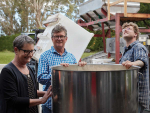One of the most concerning issues facing winery and vineyard owners in New Zealand, is that of succession. How do you go about passing the baton to the next generation, or create an exit strategy that satisfies everyone?
It is understandable why this issue is rearing its head now in the wine industry, given the majority of those owning the assets are baby boomers, in the over 55 age group. Many have come through the ranks, developing a vineyard and planting the original grapes, or building a winery and brand. Now they are looking ahead to the future – unsure how to extricate themselves from the business they have built up.
While there is no all encompassing, one fit all solution to succession planning, Richard Longman, a partner in Pricewaterhouse Coopers says there are a few areas that need to be considered well in advance.
A Sustainable Business
Sustainability and succession tend to go hand in hand, Longman says. The business you are planning to hand over or exit needs to be sustainably viable – and the owner needs to have a realistic perspective on that sustainability.
“This can be a difficult one as people generally over estimate the value, which could cause issues in the future,” he says. “If you are thinking about handing your business down the family line, you need to have an open and honest discussion on what the values are, otherwise you may be missing out on opportunities. For example you have a wine company and the market value might be $10 million, but if you hold the view that it’s worth $15 million and someone comes in offering 10, 11 or 12 million and you turn it down under the false impression it is worth more, you may regret it later.”
If selling to a third party, ensure you make it attractive to the buyer.
“Do you have supply arrangements locked in?,” Longman says. “Do you have customer contracts and positions locked in as well? How much certainty can you give to a purchaser that your business is sustainable. A lack of planning can severely impact on the value achieved.”
Understand Your Objectives
Are the stakeholders aware of what you are planning to do? Have you had those crucial conversations with family members? Are your objectives realistic? Longman says it sometimes helps to have a sounding board, or confidant to bounce ideas off, specifically someone who will tell you honestly.
Does the person you are seeking to hand over to have the skills, experience and appetite to take the business on, and do they actually want to?
Planning and Preparation
Well before you leave the business, or hand it on, you need to lay some ground work with all those you deal with, Longman says.
“Are there supply relationships that need to be nurtured or are there customer relationships that need to be transferred? If someone is going to come into the business, how is the market going to take to that person? You don’t want to be doing this in a three or six month period.”
Sources of Capital
Longman says it is important to keep the banks up to date on any exit or succession strategy. They also can offer advice on the pitfalls to avoid and how to make the transition a smooth one.
“I really encourage people who are looking forward to exiting or bringing in family, to have that honest discussion with the bank. They do like to be involved and they can look to the future.”
In terms of whether or not you are leaving money in the business, he says, think long and hard about what it will mean for you in your retirement and how it will impact on the wider family.
“Vendor finance may be something that has to happen to facilitate the transfer, because by and large wine companies and vineyards are valuable assets.”
All in all, Longman says the most important thing is to plan, well in advance.
“Fail to plan and you plan to fail.”












